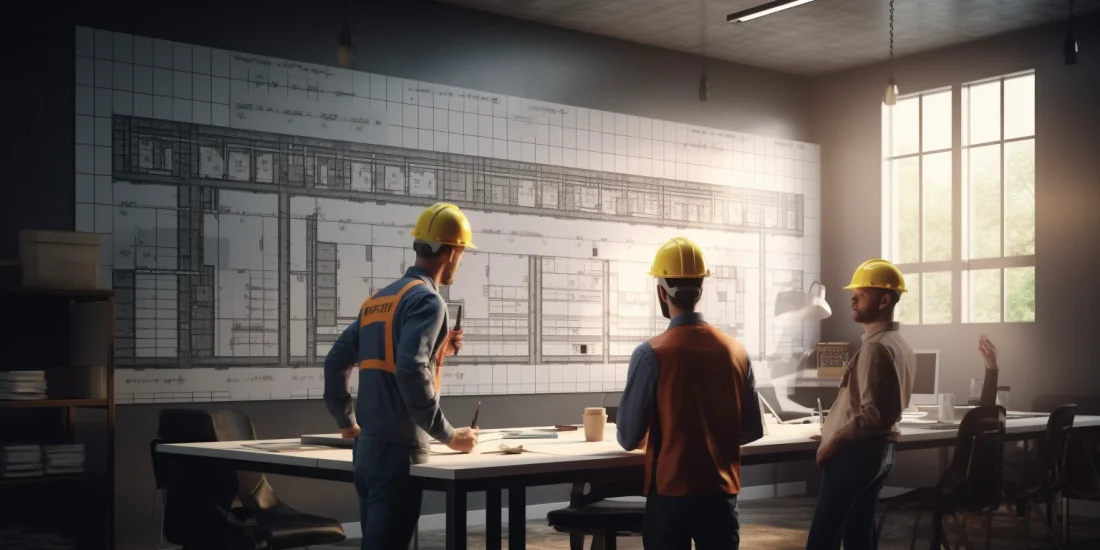A construction scheduler is an essential role on any construction project, responsible for creating and managing the project schedule. It is a highly detail-oriented and critical position that ensures the timely completion of all construction activities, while also considering budget constraints, resource availability, and potential delays.
The main responsibilities of a construction scheduler include creating a detailed project schedule, updating and maintaining it throughout the project, and communicating with the project team to ensure all activities are understood and completed on time. They also monitor the progress of each activity and make adjustments to the schedule as needed to prevent delays and keep the project on track.
A construction scheduler works closely with project managers, contractors, subcontractors, and other stakeholders to coordinate all aspects of the project timeline. They must have excellent communication and organizational skills to keep all parties informed and on the same page.
In addition to scheduling, a construction scheduler also plays a vital role in risk management. They identify potential delays and work with the project team to develop contingency plans to minimize any impact on the timeline. They also evaluate the impact of any changes to the schedule and communicate these changes to the project team.
To be successful as a construction scheduler, one must have a solid understanding of construction processes, as well as strong analytical skills. They must also be proficient in project management software and scheduling tools to create and maintain schedules accurately. Construction schedulers are expected to be adaptable and have excellent problem-solving skills to handle unexpected changes and challenges that may arise during the project.
In conclusion, a construction scheduler is a crucial role in the success of any construction project. Their ability to effectively plan, monitor, and adjust the project schedule is essential to ensure the project is completed on time and within budget. They are an integral part of the project team and play a significant role in its overall efficiency and success.
Role and Responsibilities of a Construction Scheduler
A construction scheduler is a key member of a construction project team, responsible for managing and coordinating all aspects of the project schedule. Their role is crucial in ensuring the timely completion of construction activities while also considering budget limitations, resource availability, and potential delays.
The primary responsibility of a construction scheduler is to create a detailed project schedule. This involves breaking down the project into smaller tasks and determining the sequence in which they should be completed. They work closely with the project manager to understand the project objectives and develop a schedule that aligns with those goals.
Once the schedule is in place, the construction scheduler continuously monitors and updates it to reflect the progress of each task. They communicate any changes or delays to the project team and work with them to adjust the schedule accordingly. This requires excellent communication and collaborative skills to keep all parties on the same page and ensure the project stays on track.
Risk management is another significant responsibility of a construction scheduler. They are responsible for identifying potential delays and developing contingency plans to mitigate their impact on the project timeline. This involves evaluating the impact of any changes to the schedule and communicating these changes to the project team.
A construction scheduler also plays a critical role in resource management. They monitor resource availability and work with the project team to ensure that resources are allocated efficiently to prevent delays and keep the project within budget.
Importance of Effective Schedule Management in Construction Projects
Effective schedule management is crucial to the success of any construction project. It ensures that the project is completed on time, within budget, and to the desired quality standards. Firstly, proper schedule management helps to identify potential risks and minimize their impact on the project. A well-planned and updated schedule can help project managers anticipate potential delays and develop contingency plans to mitigate their impact. This allows for a more efficient use of resources and helps to keep the project on track.
Accurate schedule management also promotes effective communication among the project team, stakeholders, and clients. A detailed and updated schedule is essential for keeping all parties informed and aware of project timelines and progress. This helps to prevent misunderstandings, conflicts, and delays.
Moreover, effective schedule management enables proper resource allocation and utilization. With a well-planned schedule, project managers can ensure that resources are allocated efficiently, preventing over or underutilization. This not only saves time and money but also helps to maintain a high level of productivity throughout the project.
In addition, proper schedule management promotes project efficiency by ensuring that tasks are completed in the most logical sequence. This reduces the risks of rework, delays, and cost overruns. It also facilitates the identification of critical path activities, allowing project managers to prioritize and allocate resources accordingly.
Lastly, effective schedule management plays a significant role in meeting client expectations. A well-planned and executed project schedule ensures that the project is completed within the agreed-upon timeline, meeting the client’s expectations and building a positive reputation for the construction company.
Collaboration and Communication with Project Team as a Construction Scheduler
As a construction scheduler, collaboration and communication with the project team are essential for the success of a project. This involves working closely with the project manager, contractors, subcontractors, and other stakeholders to ensure that everyone understands the project schedule and their roles in it.
Effective collaboration starts with developing a detailed project schedule that is shared with the project team. This schedule should clearly outline the timeline for each task and identify any critical path activities. Regular meetings should be held to discuss the schedule and address any questions or concerns from team members. This encourages open communication and ensures that everyone is on the same page.
A construction scheduler must also be proactive in managing changes to the project schedule. This requires constant communication with the project team to identify any potential delays or changes to the timeline. The scheduler should work with the team to develop contingency plans to mitigate the impact of these changes and keep the project on track.
These tools allow for real-time updates and collaboration, ensuring that everyone has access to the most up-to-date schedule and any changes that have been made.
Moreover, effective collaboration and communication with the project team also involve taking into account the team’s feedback and suggestions. This creates a sense of teamwork and empowers team members to take ownership of their responsibilities, leading to increased productivity and efficiency.
Risk Management in Construction Scheduling
Risk management is an essential aspect of construction scheduling that involves identifying and mitigating potential risks that could lead to delays in the project timeline.
One of the most significant risks in construction scheduling is delays caused by unforeseen circumstances, such as bad weather or unexpected site conditions.
Another risk that construction schedulers must manage is resource availability. They must ensure that all necessary resources, such as materials and manpower, are available at the right time to prevent delays. This involves coordinating with contractors and subcontractors. To ensure that they have the resources essential to complete their tasks on time.
Moreover, changes to the project, such as design modifications, can pose a significant risk to the schedule. It is the construction scheduler’s responsibility to evaluate the impact of these changes on the timeline and develop a plan to address any potential delays.
Proper risk management in construction scheduling also involves effective communication and collaboration with the project team. They work closely with project managers, contractors, and subcontractors to identify potential risks and develop strategies to mitigate their impact.
Skills and Tools Required for a Successful Construction Scheduler
Being a successful construction scheduler requires a combination of skills and the ability to effectively use scheduling tools to create and manage project schedules. Firstly, strong analytical skills are vital for a construction scheduler in creating an accurate and comprehensive project schedule. This includes the ability to break down the project into smaller tasks, determine their sequence, and identify critical path activities.
Communication and collaboration skills are also essential for a construction scheduler. They must be able to effectively communicate with all members of the project team. To ensure that everyone understands the project schedule and their roles in it. This involves maintaining open communication, actively listening to team members’ feedback and suggestions, and facilitating discussions to resolve any scheduling conflicts.
Organizational skills are crucial for a construction scheduler to manage the project schedule and keep it up to date.
Being proficient in project management software and scheduling tools is also necessary for a successful construction scheduler. These tools allow schedulers to create and maintain detailed schedules and track project progress. They should also have the ability to troubleshoot any issues with these tools to ensure smooth scheduling processes.
In addition to these skills, a successful construction scheduler should have a solid understanding of construction processes and be familiar with building codes and regulations. This will help them understand the project requirements and make accurate schedule projections.
Having strong problem-solving and critical thinking skills is also essential for a construction scheduler. They must be able to think on their feet and make quick decisions to address any unexpected delays or changes in the project.
Key Takeaways
Construction schedulers play a vital role in the success of construction projects by creating and managing the project schedule. They ensure the completion of all tasks while considering budget constraints, resource availability, and potential risks. Effective schedule management is crucial to minimize delays, promote efficient resource utilization, and maintain client satisfaction. Collaborating and communicating with the project team is essential for successful construction scheduling. Risk management is also a significant aspect of construction scheduling, requiring proactive measures and effective communication. They must have a combination of skills such as analytical, communication, and organizational skills. As well as proficiency in project management software and scheduling tools.



